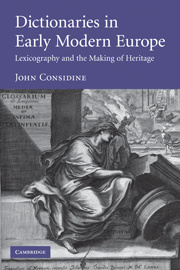Description
Dictionaries in Early Modern Europe
Lexicography and the Making of Heritage
Author: Considine John
A lively history of early modern dictionaries and their makers.
Language: EnglishApproximative price 54.78 €
In Print (Delivery period: 14 days).
Add to cart
Dictionaries in Early Modern Europe
Publication date: 03-2011
Support: Print on demand
Publication date: 03-2011
Support: Print on demand
Approximative price 80.98 €
Subject to availability at the publisher.
Add to cart
Dictionaries in early modern europe: lexicography and the making of heritage
Publication date: 03-2008
408 p. · 15.7x23.5 cm
Publication date: 03-2008
408 p. · 15.7x23.5 cm
Description
/li>Contents
/li>
Dictionaries tell stories of many kinds. The history of dictionaries, of how they were produced, published and used, has much to tell us about the language and the culture of the past. This monumental work of scholarship draws on published and archival material to survey a wide range of dictionaries of western European languages (including English, German, Latin and Greek) published between the early-sixteenth and mid-seventeenth centuries. John Considine establishes a powerful model for the social and intellectual history of lexicography by examining dictionaries both as imaginative texts and as scholarly instruments. He tells the stories of national and individual heritage and identity that were created through the making of dictionaries in the early modern period. Far from dry, factual collections of words, dictionaries are creative works, shaping as well as recording early modern culture and intellectual history.
1. Introduction; 2. The classical heritage I: philology and lexicography; 3. The classical heritage II: Henri Estienne and his world; 4. Vernacular heritages I: Germany and the Netherlands 1500–1618; 5. Vernacular heritages II: England to circa 1650; 6. Vernacular heritages III: England and Scandinavia, circa 1650–75; 7. Postclassical heritages: du Cange and his world; 8. Shared heritages: polyglot and universal dictionaries; Conclusion; Bibliography.
© 2024 LAVOISIER S.A.S.
These books may interest you

Academy Dictionaries 1600–1800 32.87 €

Academy Dictionaries 1600–1800 67.55 €



